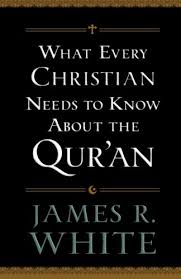Book Review: What Every Christian Needs to Know About the Qur’an


What Every Christian Needs to Know About the Qur’an, James R. White. Minneapolis: Bethany House Publishers, 2013. Softcover, 311 pages.
More than ever, Christians need to be equipped to deal with the challenges posed by Islam. We often live beside Muslims, work alongside them, and study with them. It’s good to have helpful resources to inform our conversations with our Muslim neighbours. Though it is now a couple of years old already, James White’s book on the Muslim sacred text is one of those valuable helps.
White is the author of numerous non-fiction books. He’s well-known as an author, speaker, and debater. Though it does not factor into this book at all, he is an elder in a Reformed Baptist church in Phoenix, Arizona. He is the director of Alpha and Omega Ministries, an organization with a focus on apologetics (done in a Reformed, presuppositional manner).
Rather than summarize everything in this book, let me just highlight two points which stood out for me. One has to do with what the Qur’an says about the Christian doctrine of the Trinity. In chapter 4, White points out that the Qur’an says Christians believe the Trinity to consist of Allah, Jesus, and Mary. Christians are alleged to believe that Allah and Mary had relations to produce Jesus. This is important because:
Everyone affected would affirm that by the early decades of the seventh century, God Himself would have a perfect knowledge of what the doctrine of the Trinity actually says. And if that doctrine does not accurately represent His own self-revelation, He would be in the perfect position to refute its falsehoods with devastating precision. But is this what we find in the Qur’an? (76)
The Qur’an doesn’t describe the Trinity correctly, and so the Qur’an can’t be taken seriously as a revelation from God.
In chapter 11, White has a penetrating discussion about the text of the Qur’an. Muslims claim that it is a perfect, immutable text. Of course, that’s contrasted with the text of the Bible which, they allege, has been mutilated by Jews and Christians. White gives a couple of examples from Muslim writers. This is one of them:
Muslims and non-Muslims both agree that no change has ever occurred in the text of the Qur’an. The above prophecy [Surah 15:9] for the eternal preservation and purity of the Qur’an came true not only for the text of the Qur’an, but also for the most minute details of its punctuation marks as well…It is a miracle of the Qur’an that no change has occurred in a single word, a single [letter of the] the alphabet, a single punctuation mark, or a single diacritical mark in the text of the Qur’an during the last fourteen centuries. (250)
White demonstrates that this claim is patently false. He notes that “even widely published editions of the Qur’an contain information indicating variations in the very text” (272-273).
He cites Yusuf Ali’s edition with its note on Surah 33:6. In The Hidden Origins of Islam (ed. by Karl-Heinz Ohlig and Gerd-R. Puin), there is an essay by Alba Fedeli on variant readings in early Qur’anic manuscripts. It is simply not true that there is a single immaculate Qur’an text preserved from the time of Muhammad.
One question I wish White would have addressed is whether these claims are made in ignorance or deliberately to deceive. There is a doctrine in Islam known as al-Taqqiya. This teaching says it is permissible to lie in order to advance the cause of Islam. This is one of the things making Islam such a threat to western civilization in general, and Christianity in particular. How can you tell when a Muslim is lying about Islam?
I would recommend this book to anyone who has regular contact with Muslims. Be aware though: most, if not all, of the points raised by White in the book have rebuttals by Muslim apologists somewhere online. The rebuttals are weak, but if you are going to use White’s material in conversations it would be advisable to prepare yourself beforehand for what your Muslim neighbour may bring back in response.


